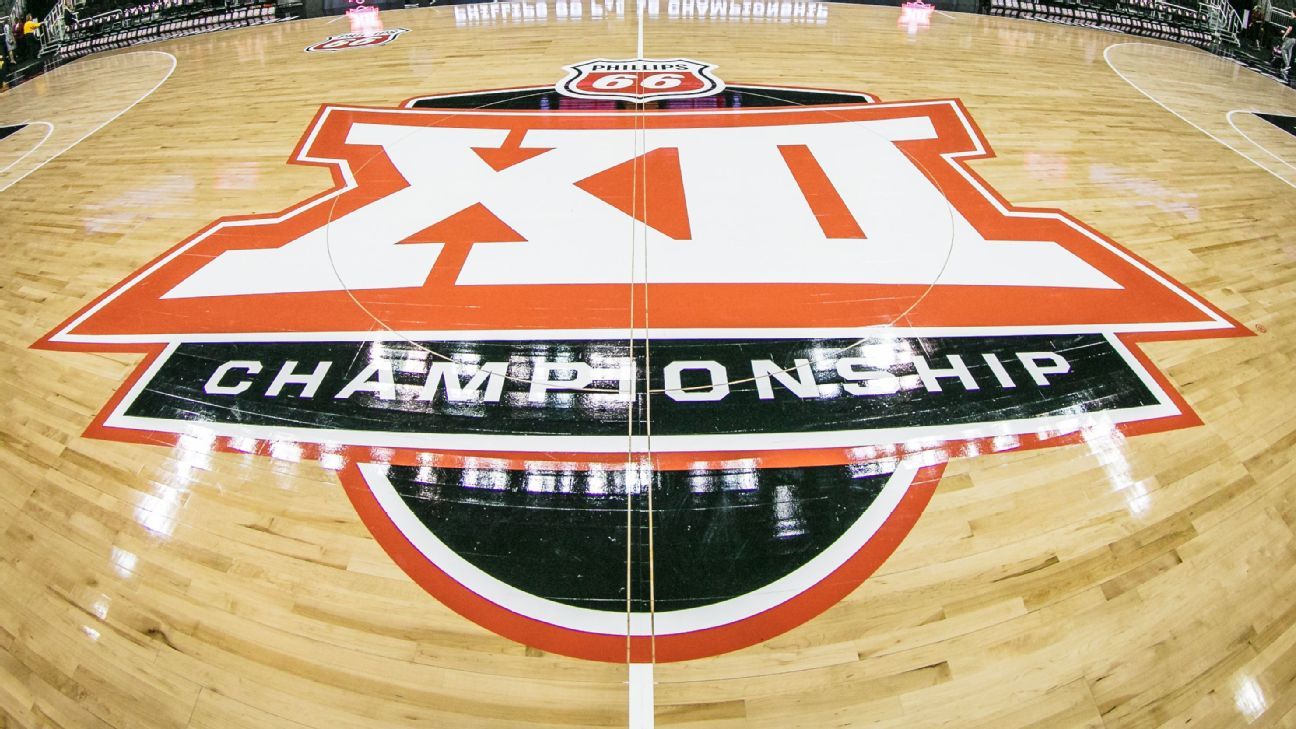
Everything you need to know about college basketball's place in the SEC, Big 12 shake-up
Is Texas' and OU's planned move to the SEC the first domino that will topple college basketball as we know it?
ESPN staff
Texas' and Oklahoma's planned moves from the Big 12 to the SEC have the potential to stand as one of college sports' most earth-shaking developments of all-time, with the league affiliations of many current Division I schools, the future of several conferences, and the future of the NCAA itself all hanging in the balance as the details develop. Though most of the focus has rested primarily on what happens in football -- college sports' leading revenue-driver by a wide margin -- a downstream impact on all other collegiate sports is nearly certain to be felt. Men's and women's college basketball will be among the impacted, but how much, and in what ways? ESPN's college basketball reporting team of Jeff Borzello, Myron Medcalf and Mechelle Voepel discussed what we know, and what the game's stakeholders will be watching most closely in the coming weeks, months and years:
Texas and Oklahoma would have to move to the SEC in basketball and not just football, right?
That's the expectation. Basketball has been mostly an afterthought in the realignment discussions, with football driving every decision and every rumor. That was the case during the last wave of realignment a decade ago, and it's the same now. In fact, most basketball coaches -- including ones in the Big 12 and SEC -- were in the dark regarding last week's developments. Multiple coaches told me they found out the same way we all did, via social media.So Texas and Oklahoma's men's and women's basketball programs do seem likely to follow in football's footsteps when it comes to leaving the Big 12 for the SEC -- and football will also be the major factor in whatever dominoes are next to fall. From an athletic resources standpoint, those two programs stand to benefit from joining a juggernaut league as opposed to staying in a league without its marquee football brands. Kansas is one of the greatest men's college basketball programs of all time and Baylor just won a men's national championship, but it's their football programs that will likely dictate what happens next. -- Jeff Borzello
Should we expect the SEC's additions to touch off a new wave of conference realignment that will also impact basketball?
If the SEC's move was the first maneuver in a new world that will feature two or three superconferences, then it's fair to wonder how the musical chairs will affect college basketball. In the Big 12, Baylor, Kansas, Oklahoma State, Iowa State, Texas Tech and TCU, West Virginia and Kansas State could all enhance a conference if the Big 12 disappears. While the potential breakup of the Big 12 could send second-tier football programs throughout different leagues around the country, it could also strengthen those same leagues in basketball. The schools that potentially move to the Big Ten, Pac-12 and ACC would all boost those conferences.For example, if the Big Ten adds Kansas, then it certainly will gain a powerhouse program. But it's also just another bid on Selection Sunday for a league that will get a bunch of them either way. And if the fallout sends some of these schools to other leagues, such as the American or the Mountain West, then a new power conference in men's basketball could emerge.
It is also fair to wonder if gigantic leagues might lead to gigantic conference schedules that could continue to reduce nonconference slates and the ability of non-major leagues to boost their at-large résumés for Selection Sunday. -- Myron Medcalf
Is the state of the NCAA tournament as we know it in jeopardy?
I don't think so, at least in the short-term. Even if this move is the first domino in a string that results in four superconferences with 16-20 teams apiece, and essentially operates outside the NCAA's purview in college football, I can't see the NCAA tournaments falling apart. The NCAA still controls and operates every postseason besides football, and the money involved in the men's basketball tournament makes it far-fetched that it would fall apart or develop into an exclusive enclave for only the top 70-80 programs. It is also worth noting that the multibillion dollar TV deal for the NCAA men's tournament runs through 2032.With the introduction of Name, Image, Likeness, the Alston case and potentially another wave of realignment, the NCAA landscape is obviously changing. What will the organization's role be five years from now, 10 years from now? We have no idea. But its ability to consistently put on flawlessly-run postseason tournaments -- for the most part -- isn't in peril just yet. -- Jeff Borzello